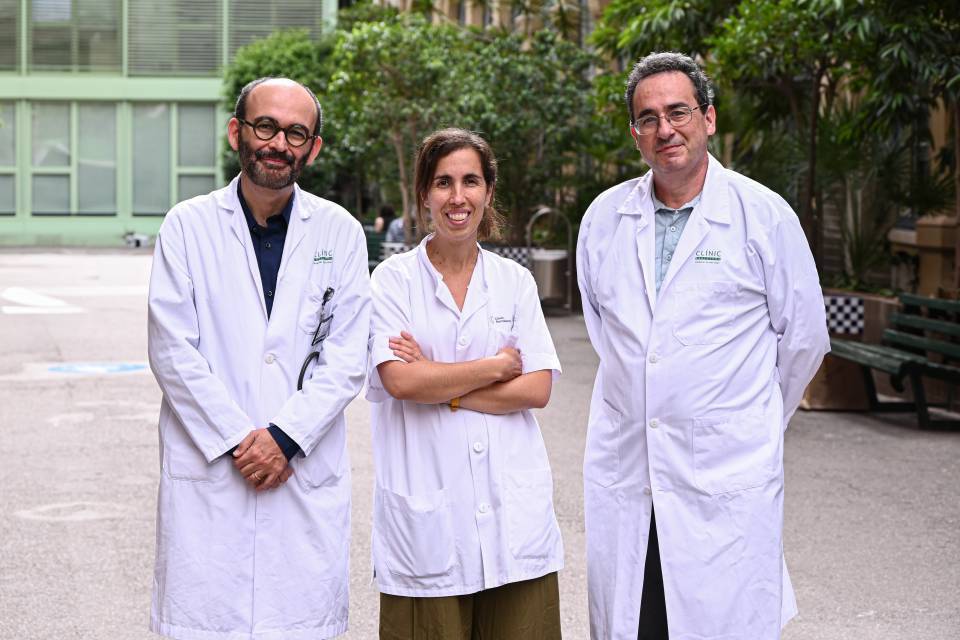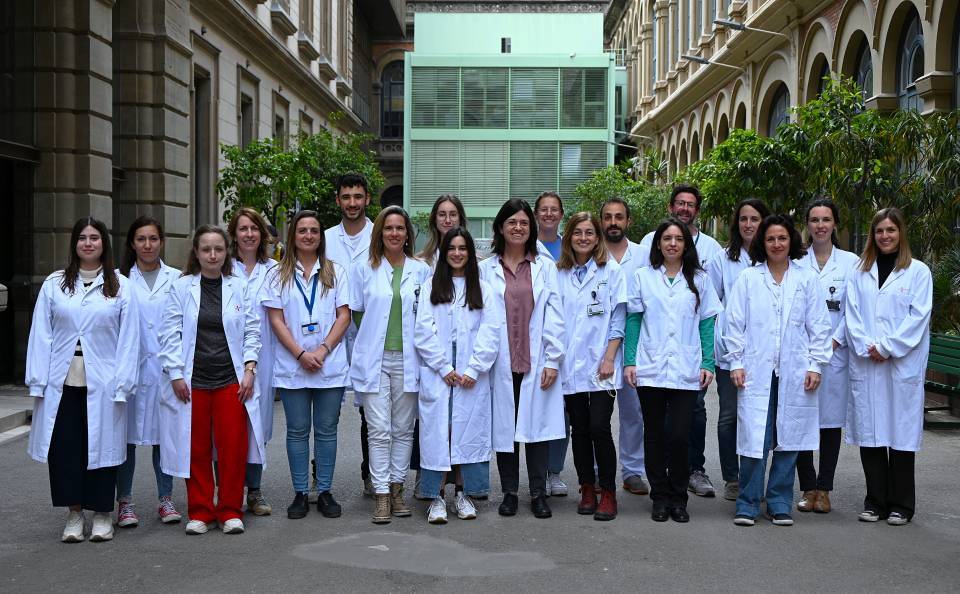A team of researchers from IDIBAPS and the Hospital Clínic de Barcelona has discovered that the composition of the gut microbiota—in other words, the collection of bacteria that live in our intestines—can have a decisive influence on the effectiveness of CAR T-cell therapy in patients with multiple myeloma, a type of bone marrow cancer.
The study, published in the journal Blood Cancer Discovery, opens the door to better personalized treatments and the development of new combined therapeutic strategies. The article was led by Manel Juan, head of the Immunology Service at the Hospital Clínic and head of the IDIBAPS Immunogenetics and Immunotherapy in Autoinflammatory and Immune Responses group, and Mireia Uribe-Herranz, researcher in the same group.
CAR T-cell therapy consists of genetically modifying T-cells in the patient’s immune system, so that they recognize and attack tumour cells. Although it has revolutionized the treatment of certain haematological cancers, not all patients respond in the same way. Understanding why is one of the great challenges of modern medicine.
“We wondered whether the gut microbiota could play a role in this variability in response," explains Uribe-Herranz. “We know that intestinal bacteria can modify the immune system, and we wanted to see if this also affected CAR T-cell therapy.”
To do this, the team analysed samples from patients with multiple myeloma treated with the CAR T-cell therapy developed at the Hospital Clínic, ARI0002h. They studied both the composition of the microbiota and the metabolites present in the intestine - molecules produced by bacteria that can have effects on human cells.
The results were clear: there is a correlation between certain microbiota and metabolite profiles and the clinical response to CAR T-cell therapy. More specifically, the presence of certain bacteria and metabolites such as succinate was associated with a better response to treatment.
According to Manel Juan, “these findings allow us to start thinking about the microbiota as a biomarker: a tool that can help us predict which patients will respond better to CAR T-cell therapy, even before administering it.”
The implications of this discovery are manifold. On the one hand, it could improve patient selection and treatment planning. On the other hand, it opens the door to interventions aimed at modifying the microbiota to enhance the efficacy of the therapy. This includes everything from specific diets to the use of prebiotics, probiotics, or even faecal microbiota transplants.
For the scientific community, the study represents a step forward in understanding the interaction between microbiota and immunotherapy. Microbiota and metabolite profiles could become useful biomarkers for risk assessment and response prediction. In addition, it opens the door to the design of combination therapies that include microbiota modulation as an integral part of treatment.
According to the authors, the next steps are to validate these results in larger patient cohorts, and to further investigate the molecular mechanisms underlying this relationship. Clinical trials are also planned to test whether the direct modification of the microbiota can improve the results of CAR T-cell therapy. Finally, they want to explore whether these findings are applicable to other types of cancer treated with immunotherapy.
The study was carried out at IDIBAPS and the Hospital Clínic with samples from a multicentre clinical trial with multiple myeloma patients treated with CAR T-cell therapy led by Carlos Fernández de Larrea, from the Hospital Clínic Haematology Service and head of the IDIBAPS Myeloma, Amyloidosis, Macroglobulinaemia and other Gammopathies research group. This collaboration was essential in order to obtain a representative sample and robust results.
In the words of Manel Juan, “this work is an example of how translational research—which connects the laboratory with the patient—can generate useful knowledge that can be applied to clinical practice.” And Mireia Uribe-Herranz concludes: “Understanding the microbiota not only helps us improve current treatments, but also opens up a new avenue for tackling cancer from a more comprehensive and personalized perspective.”
Paper of reference
Mireia Uribe-Herranz, Aina Oliver-Caldés, Neus Martínez-Micaelo, Marta Español-Rego, Maria Val-Casals, Roberto Martínez-Soler, Elisa Rubio-Garcia, Valeria Brunello, Erik Z. Mihelic, Nela Klein-González, Daniel Benítez-Ribas, Núria Amigó, Andrea Vergara, Valentin Ortiz-Maldonado, Luis Gerardo Rodríguez-Lobato, Julio Delgado, Iñaki Ortiz de Landazuri, Verónica González-Calle, Valentín Cabañas, Beatriz Martin-Antonio, Lorena Pérez-Amill, Juan Luis Reguera-Ortega, Paula Rodríguez-Otero, Bruno Paiva, Joaquín Martínez-López, Maria-Victoria Mateos, Mariona Pascal, Álvaro Urbano-Ispizua, Europa Azucena González-Navarro, Carlos Fernández de Larrea, Manel Juan; Microbiota Shape Metabolic and Immune Determinants of CAR-T Therapy and Correlate with Outcomes in Myeloma. Blood Cancer Discov 2025; https://doi.org/10.1158/2643-3230.BCD-24-0203




